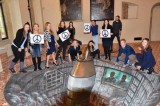As nuclear tensions increase following North Korea’s most recent missile test, young academics, policy analysts and activists from around the world released an appeal calling on world leaders to reduce the risks of nuclear weapons being used and to support United Nations initiatives for nuclear disarmament, including the High-Level Conference on Nuclear Disarmament to take place in 2018.
The appeal – Reach High for a Nuclear-Weapons-Free World – was adopted at the conclusion of a three-day conference held at Charles University in Prague from Nov 27-29, 2017.
The conference was organised by the Abolition 2000 Youth Network and co-sponsored by the Basel Peace Office, Parliamentarians for Nuclear Nonproliferation and Disarmament (PNND), Prague Vision Institute for Sustainable Security, Centre for Security Policy at Charles University (SBP) and UNFOLD ZERO.
It included participants from Austria, Belgium, Canada, Chile, Czech Republic, France, Germany, Italy, Japan, Kazakhstan, New Zealand, Portugal, Russia, Switzerland, United Arab Emirates, United Kingdom and the United States.
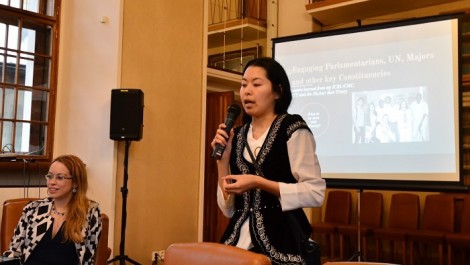
Marzhan Nurzhan speaking at the conference
‘Any use of nuclear weapons regardless of which country uses them, would cause catastrophic health, economic and environmental consequences that would last for generations,’ says Marzhan Nurzhan, Convener of the Youth Network and a citizen of Kazakhstan which was devastated by Soviet nuclear tests during the Cold War.
'Young people have a vested interest in the future and should be included in the deliberations, negotiations and campaigns to prevent nuclear war and achieve nuclear disarmament. We can work alongside and in partnership with our seniors, who have expertise and experience. Such inter-generational cooperation is essential to ensure success.'
No-first use of nuclear weapons
The appeal calls specifically on the nuclear armed States – including United States and North Korea – to pledge never to be the first to use nuclear weapons, as well as to ensure that all nuclear weapons systems are taken off high-readiness to use, and to commit to negotiations on phased nuclear disarmament.
‘The escalating threat of nuclear confrontation between North Korea and the USA is frightening,’ says Alyn Ware, Global Coordinator of Parliamentarians for Nuclear Nonproliferation and Disarmament (PNND), a co-sponsor of the conference. ‘But calling on North Korea to unilaterally give up its nuclear weapons while they are threatened with nuclear attack or pre-emptive strike from other countries, is unrealistic.'
'A no-first-use pledge by all nuclear-armed States, and the establishment of a regional nuclear-weapon-free zone, have much more chance of success. These proposals already have considerable support from parliamentarians in all three key countries – Japan, South Korea and North Korea.’
UN High Level Conference
The youth appeal calls on all governments to attend the 2018 UN High-Level Conference on Nuclear Disarmament at the highest level (Prime Minister, President, Foreign Minister or Minister for Disarmament), in order to be able to make concrete progress on nuclear-risk reduction and disarmament.
The appeal also calls on non-nuclear countries to sign the new Treaty on the Prohibition of Nuclear Weapons, which provides for a complete prohibition of nuclear weapons by those countries that sign. 53 countries have so far signed the treaty. The appeal puts forward the objective of 100 countries signing by the end of the High-Level Conference.
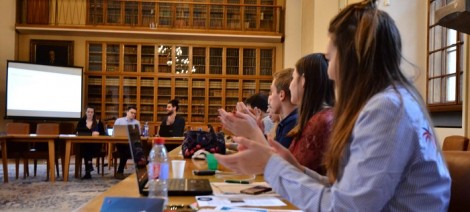
Participants at the conference supporting a proposed action on nuclear weapons divestment
Move the nuclear weapons money
The appeal also calls for the $100 billion nuclear weapons budget (most of which is spent on the US nuclear arsenal) to be slashed, and the funds to instead by allocated to climate protection, implementing the sustainable development goals, and for other social and economic needs.
‘High nuclear weapons budgets have created a self-perpetuating cycle, where the corporations manufacturing the weapons have a vested interested in maintaining the nuclear-arms race, and workers in the nuclear weapons factories have an interest in keeping their jobs,’ says Bethan Edwards, PNND researcher and conference speaker.
‘In order to revert to a peace economy, we must encourage nuclear weapons corporations to convert to alternative production, and we must end public and private investments in these corporations until they do so.’
‘Already, at least four governments – including Lichtenstein, New Zealand, Norway and Switzerland – have adopted policies against investments in nuclear weapons corporations,’ says Calvin Konig, researcher for the Basel Peace Office, another co-sponsor of the conference. ‘The adoption of the Treaty on the Prohibition of Nuclear Weapons provides an opportunity for us to convince more countries to do so.’
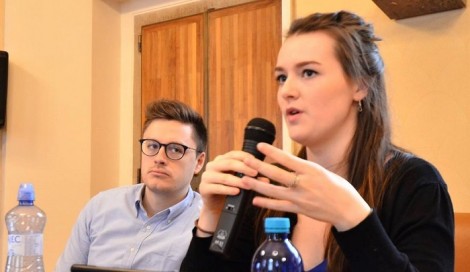
Bethan Edwards speaking at the conference. On her left is Calvin Konig who also spoke on economic aspects of the nuclear arms race.
Replace nuclear deterrence with common security
The appeal recognizes that a large number of countries still rely on nuclear deterrence as part of their security doctrine, but affirms that these countries are legally obliged to achieve nuclear disarmament.
‘We call on nuclear-reliant countries to fulfill that obligation, while maintaining their security, by replacing nuclear deterrence with common security approaches and international law,’ says Kristýna Chyňavová, a law student at Charles University and a participant in the conference.
'The UN Charter provides for effective approaches to achieving security through diplomacy, negotiation, mediation, arbitration, adjudication, use of regional mechanism and use of the UN Security Council and General Assembly. Even in these turbulent times It is possible to replace to law of force with the force of law.’
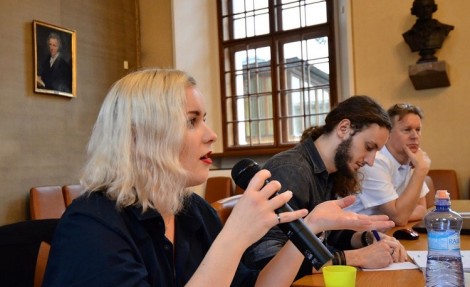
Kristýna Chyňavová speaking at the conference
Inter-generational action
‘The Hibakusha (survivors of the Hiroshima and Nagasaki nuclear bombings) have been appealing for the abolition of nuclear weapons in their lifetime,’ says Kanau Kobayashi a Japanese university student who helped organize the conference.
‘This inter-generational campaign, of youth working with Hibakusha and other elders for nuclear abolition, has the possibility to succeed, especially if world leaders and civil society take seriously the opportunity provide by the UN High-Level Conference next year.’
Atom Muzeum
The conference included a field trip to the Atom Muzeum, a former nuclear weapons depot in the forest of Misov, approximately one hour drive from Prague.
The nuclear weapons depot, a massive underground cement bunker, was ordered by the Soviet leadership under Nikita Khrushchev, and built in the mid to late 1960s. It was one of three such places in the former Czechoslovakia, and a dozen across Soviet Warsaw Pact allies, but the only one believed still to be intact.
“This was the most secret place in Czechoslovakia. No Czechs had access there,” says Vaclav Vitovec, head of the Iron Curtain Foundation that operates the muzeum. The depot includes a number of rooms with the remains of equipment, from loading cranes to helium and vacuum pumps used to maintain the warheads, a diesel engine, gas masks, air filters and various tools.
There are also exhibitions on the nuclear arms race between the United States and the Soviet Union, the communist occupation of Czech Republic, and the impact of nuclear tests undertaken by the nuclear powers.
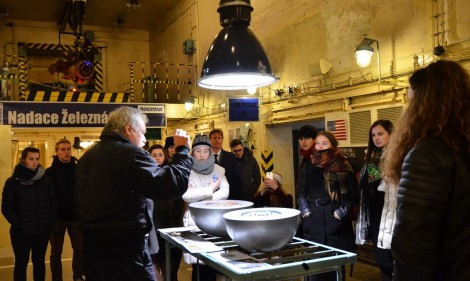
Vaclav Vitovec, at the Atom Muzeum, explaining how a nuclear bomb works to participants of the conference.
#3dNukeMissile
The conference participants discussed a range of social media actions to raise awareness and engage public in nuclear disarmament. One of these is the #3dNukeMissile.
This is a painting of a missile which looks three-dimensional when photographed from a certain angle. Members of the public are invited to have their photo taken while standing on or holding the chains to stop the missile being launched.
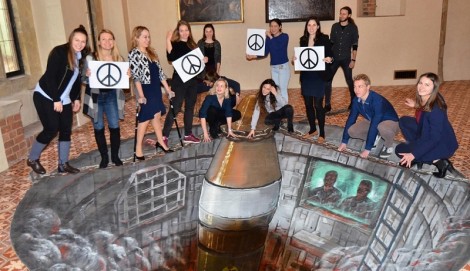
Where the Wind Blew
The conference also included a special screening of the movie 'Where the Wind Blew'.
This 72-minute documentary, tells the stories of populations in Kazakhstan and the United States who continue to suffer from the trans-generational impact of nuclear tests, conducted by the Cold War super powers, and the successful struggles of these peoples to end nuclear tests in their countries.
The film serves as a timely reminder of lessons learned about the impact of nuclear weapons; lessons that warrant renewed attention in light of the current state of world affairs where the threat of nuclear weapons use - by accident, miscalculation or intent - has returned.
Conference co-sponsors:

